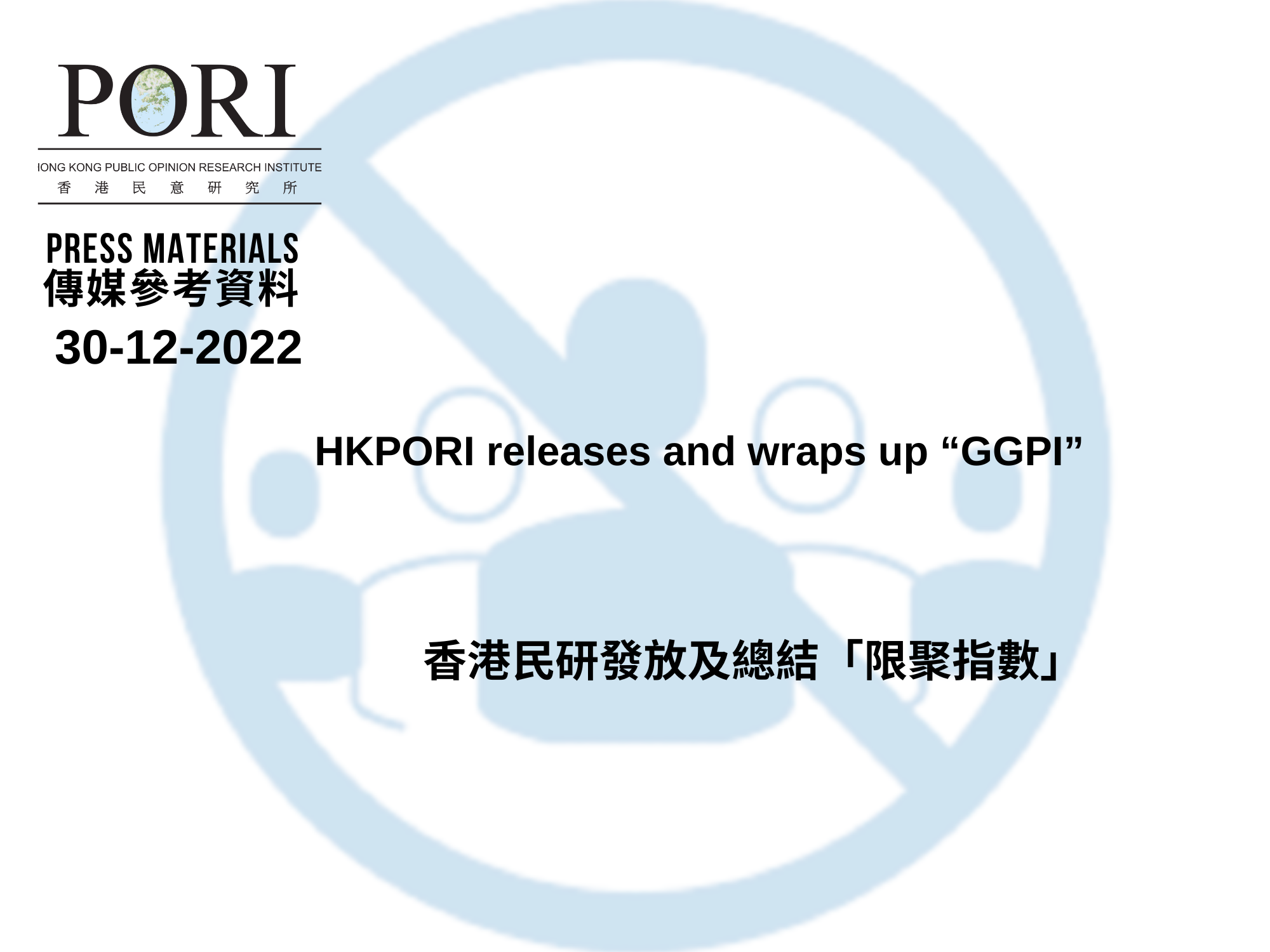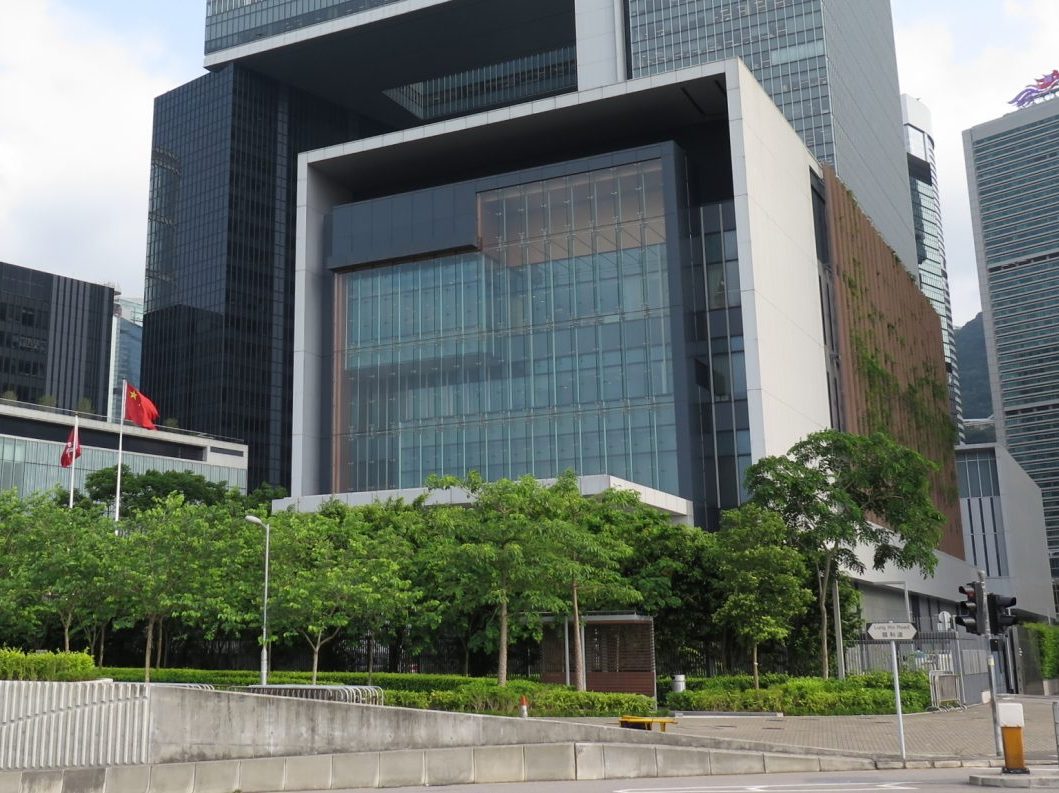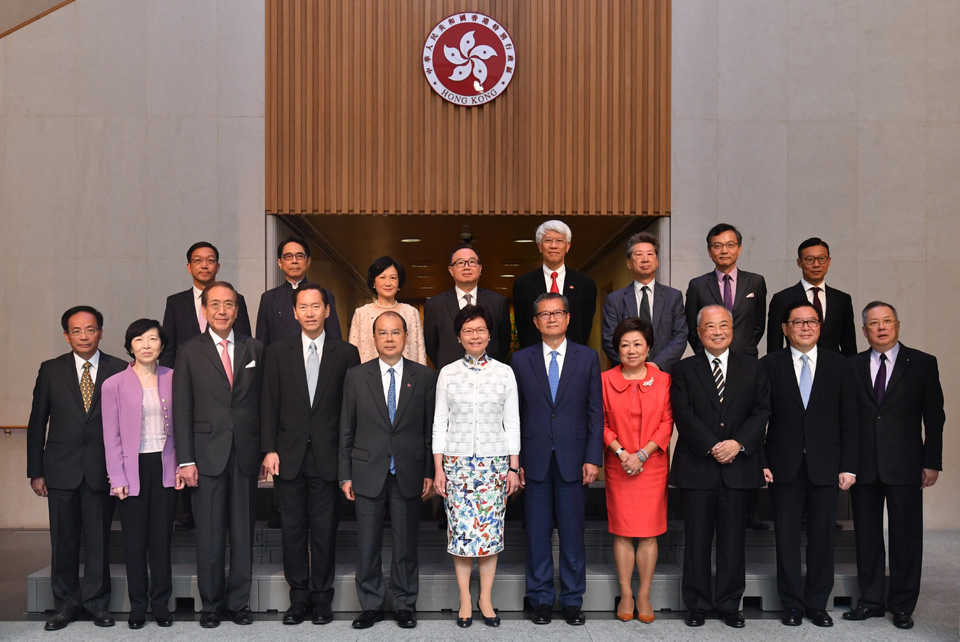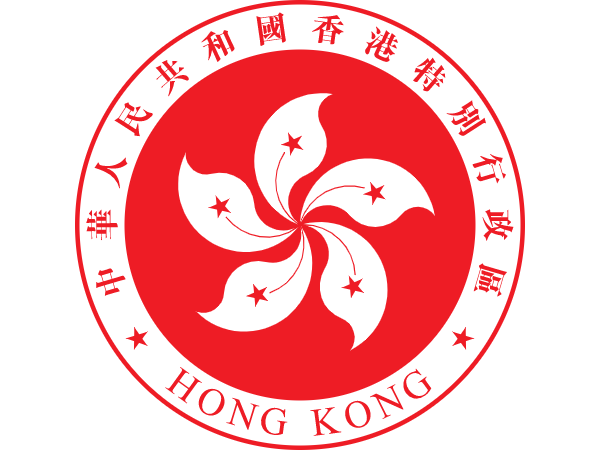March 30, 2021
Hong Kong Public Opinion Research Institute Press Conference – Press Materials
POP releases popularities of CE and principal officials,
ratings of top 5 Executive Councillors along with PSI
Special Announcement
The predecessor of Hong Kong Public Opinion Program (HKPOP) was The Public Opinion Programme at The University of Hong Kong (HKUPOP). “POP” in this release can refer to HKPOP or its predecessor HKUPOP.
Abstract
POP successfully interviewed 1,001 and 1,010 Hong Kong residents by random telephone surveys conducted by real interviewers in March. Our latest survey shows that the popularity rating of CE Carrie Lam has increased significantly by 3.4 marks compared to half a month ago to 32.8 marks, with 39% of respondents giving her 0 mark. Her net popularity stands at negative 50 percentage points. Regarding the HKSAR Government, the net satisfaction now stands at negative 42 percentage points and the net trust value stands at negative 21 percentage points. Both have somewhat dropped compared to a month ago, but the changes have not gone beyond sampling errors. As for people’s satisfaction with the current political, livelihood and economic conditions, the net satisfaction rates are negative 41, negative 48 and negative 54 percentage points respectively. The figures remain more or less the same as last month, but the net satisfaction rate with the political condition has registered a new high since December 2018. Our Top 5 Executive Councillors survey shows that people’s most familiar non-official Executive Councillors have not changed much over the past 6 months. In terms of absolute ratings, Bernard Chan ranked first, attaining 34.2 marks. Regina Ip ranked second, with 32.8 marks. The 3rd to 5th ranks went to Ronny Tong, Ip Kwok-him and Tommy Cheung, who attained 32.5, 30.0 and 27.9 marks respectively. The ratings of Bernard Chan and Ronny Tong have registered significant increases compared to half a year ago. As for the PSI, the latest figure is 69.4, down by 0.4 point from early March. The effective response rate of the rating survey is 56.8%. The maximum sampling error of percentages is +/-4%, that of net values is +/-8% and that of ratings is +/-2.9 at 95% confidence level.
Contact Information
| Naming stage of Executive Councillors | Rating stage of Executive Councillors and other surveys | ||
| Date of survey | : | 8-12/3/2021 | 22-25/3/2021 |
| Sample size[1] | : | 1,001 (including 496 landline and 505 mobile samples) | 1,010 (including 507 landline and 503 mobile samples) |
| Effective response rate | : | 47.6% | 56.8% |
| Survey method | : | Random telephone survey conducted by real interviewers | |
| Target population | : | Cantonese-speaking Hong Kong residents aged 18 or above | |
| Sampling error[2] | : | Sampling error of percentages not more than +/-4%, that of net values not more than +/-8% and that of ratings not more than +/-2.9 at 95% conf. level | |
| Weighting method | : | Rim-weighted according to figures provided by the Census and Statistics Department. The gender-age distribution of the Hong Kong population came from “Mid-year population for 2019”, while the educational attainment (highest level attended) distribution and economic activity status distribution came from “Women and Men in Hong Kong – Key Statistics (2019 Edition)”. | |
Popularity of CE and SAR Government
Recent popularity figures of CE Carrie Lam are summarized as follows:
| Date of survey | 4-8/1/21 | 18-22/1/21 | 2-5/2/21 | 24-26/2/21 | 8-12/3/21 | 22-25/3/21 | Latest change |
| Sample size | 1,000 | 1,011 | 1,018 | 1,000 | 1,001 | 1,010 | — |
| Response rate | 58.5% | 67.2% | 62.9% | 57.2% | 47.6% | 56.8% | — |
| Latest findings | Finding | Finding | Finding | Finding | Finding | Finding & error | — |
| Rating of CE Carrie Lam | 29.0 | 32.0[3] | 31.0 | 33.9 | 29.5[3] | 32.8+/-2.1 | +3.4[3] |
| Vote of confidence in CE Carrie Lam | 19% | 21% | 18% | 23%[3] | 18%[3] | 19+/-2% | — |
| Vote of no confidence in CE Carrie Lam | 72% | 69% | 70% | 67% | 72%[3] | 68+/-3% | -4% |
| Net approval rate | -54% | -49% | -52% | -43%[3] | -54%[3] | -50+/-5% | +4% |
Recent popularity figures of the HKSAR Government are summarized as follows:
| Date of survey | 19-22/10/20 | 23-26/11/20 | 18-22/12/20 | 18-22/1/21 | 24-26/2/21 | 22-25/3/21 | Latest change |
| Sample size | 624-637 | 518-529 | 558-623 | 510-600 | 519 | 570-630 | — |
| Response rate | 62.2% | 74.6% | 68.7% | 67.2% | 57.2% | 56.8% | — |
| Latest findings | Finding | Finding | Finding | Finding | Finding | Finding & error | — |
| Satisfaction rate of SARG performance[4] | 17% | 19% | 17% | 16% | 23%[5] | 21+/-3% | -2% |
| Dissatisfaction rate of SARG performance[4] | 69%[5] | 62%[5] | 60% | 61% | 56% | 62+/-4% | +6%[5] |
| Net satisfaction rate | -52% | -43% | -43% | -45% | -33%[5] | -42+/-7% | -8% |
| Mean value[4] | 2.0 | 2.1[5] | 2.1 | 2.1 | 2.3[5] | 2.2+/-0.1 | -0.1 |
| Trust in HKSAR Government[4] | 26% | 30% | 29% | 28% | 36%[5] | 32+/-4% | -4% |
| Distrust in HKSAR Government[4] | 61%[5] | 49%[5] | 56%[5] | 51% | 50% | 53+/-4% | +3% |
| Net trust | -35% | -20%[5] | -27% | -23% | -14% | -21+/-8% | -7% |
| Mean value[4] | 2.3 | 2.5[5] | 2.4 | 2.5 | 2.6 | 2.5+/-0.1 | -0.1 |
People’s recent appraisals of society’s conditions are summarized as follows:
| Date of survey | 19-22/10/20 | 23-26/11/20 | 18-22/12/20 | 18-22/1/21 | 24-26/2/21 | 22-25/3/21 | Latest change |
| Sample size | 1,020 | 1,085 | 1,014 | 1,011 | 1,000 | 1,010 | — |
| Response rate | 62.2% | 74.6% | 68.7% | 67.2% | 57.2% | 56.8% | — |
| Latest findings | Finding | Finding | Finding | Finding | Finding | Finding & error | — |
| Current political condition: Satisfaction rate[6] | 9% | 15%[7] | 16% | 15% | 18% | 21+/-3% | +3% |
| Current political condition: Dissatisfaction rate[6] | 75% | 66%[7] | 65% | 63% | 61% | 61+/-3% | +1% |
| Net satisfaction rate | -66% | -50%[7] | -50% | -47% | -42% | -41+/-5% | +2% |
| Mean value[6] | 1.7 | 2.0[7] | 2.0 | 2.1 | 2.1 | 2.1+/-0.1 | +0.1 |
| Current livelihood condition: Satisfaction rate[6] | 14% | 15% | 14% | 15% | 19%[7] | 17+/-2% | -2% |
| Current livelihood condition: Dissatisfaction rate[6] | 67% | 61%[7] | 65% | 62% | 62% | 65+/-3% | +3% |
| Net satisfaction rate | -54% | -46%[7] | -51% | -47% | -43% | -48+/-5% | -5% |
| Mean value[6] | 2.0 | 2.2[7] | 2.1 | 2.2 | 2.2 | 2.2+/-0.1 | -0.1 |
| Current economic condition: Satisfaction rate[6] | 9% | 10% | 10% | 13% | 12% | 12+/-2% | — |
| Current economic condition: Dissatisfaction rate[6] | 70% | 64%[7] | 68%[7] | 67% | 68% | 66+/-3% | -2% |
| Net satisfaction rate | -61% | -53%[7] | -59% | -54% | -56% | -54+/-4% | +2% |
| Mean value[6] | 2.0 | 2.1[7] | 2.0 | 2.1 | 2.1 | 2.1+/-0.1 | — |
Our latest survey shows that the popularity rating of CE Carrie Lam has increased significantly by 3.4 marks compared to half a month ago to 32.8 marks, with 39% of respondents giving her 0 mark. Her approval rate is 19%, disapproval rate 68%, giving a net popularity of negative 50 percentage points.
Regarding the HKSAR Government, the latest satisfaction rate is 21%, whereas 62% feel dissatisfied, thus the net satisfaction stands at negative 42 percentage points. The mean score is 2.2, meaning close to “quite dissatisfied” in general. Regarding people’s trust in the HKSAR Government, 32% of the respondents expressed trust, 53% expressed distrust, thus the net trust value is negative 21 percentage points. The mean score is 2.5, meaning between “quite distrust” and “half-half” in general. Both the net satisfaction and the net trust value have somewhat dropped compared to a month ago, but the changes have not gone beyond sampling errors.
As for people’s satisfaction with the current political, livelihood and economic conditions, the latest satisfaction rates are 21%, 17% and 12% respectively, while the net satisfaction rates are negative 41, negative 48 and negative 54 percentage points respectively. The mean scores are 2.1, 2.2 and 2.1 respectively, meaning close to “quite dissatisfied” in general. The figures above remain more or less the same as last month, but the net satisfaction rate with the political condition has registered a new high since December 2018.
Ratings of Top 5 Executive Councillors
In the naming survey, respondents could name, unprompted, up to 5 non-official Executive Councillors whom they knew best. The findings of the naming survey are summarized below, in descending order of naming rates [8]:
| Date of survey | 2-3/9/19 | 17-18/3/20 | 31/8-1/9/20 | 8-12/3/21 | Latest change in ranking |
| Sample size[9] | 510 | 502 | 508 | 538 | — |
| Response rate | 69.1% | 60.1% | 61.4% | 47.6% | — |
| Latest findings[10] | Finding | Finding | Finding | Finding & error | — |
| Regina Ip | 31%{1} | 32%{1} | 34%{1} | 30+/-4%{1} | — |
| Bernard Chan | 16%{3} | 16%{2} | 15%{2} | 17+/-3%{2} | — |
| Ronny Tong | 19%{2} | 12%{3} | 14%{3} | 12+/-3%{3} | — |
| Tommy Cheung | 3%{6} | 4%{5} | 7%{4} | 5+/-2%{4} | — |
| Lam Ching-choi | 1%{10} | 11%{4} | 4%{6} | 4+/-2%{5} | ↑1 |
| Ip Kwok-him | 3%{7} | 3%{6} | 5%{5} | 2+/-1%{6} | ↓1 |
| Arthur Li | 2%{8} | 1%{13} | 3%{8} | 2+/-1%{7} | ↑1 |
| Fanny Law | 6%{4} | 3%{7} | 3%{9} | 2+/-1%{8} | ↑1 |
| Joseph Yam | 4%{5} | 1%{12} | 4%{7} | 2+/-1%{9} | ↓2 |
| Wong Kwok-kin | 1%{11} | <1%{15} | 1%{12} | 1+/-1%{10} | ↑2 |
| Horace Cheung | <1%{15} | 2%{8} | 2%{10} | 1+/-1%{11} | ↓1 |
| Martin Liao | <1%{13} | 1%{9} | <1%{15} | 1+/-1%{12} | ↑3 |
| Jeffrey Lam | 1%{12} | 1%{10} | <1%{16} | <1+/-<1%{13} | ↑3 |
| Laura Cha | 2%{9} | 1%{11} | 2%{11} | <1+/-<1%{14} | ↓3 |
| Kenneth Lau | <1%{14} | <1%{16} | <1%{14} | <1+/-<1%{15} | ↓1 |
| Chow Chung-kong | <1%{16} | <1%{14} | <1%{13} | 0%{16} | ↓3 |
| Wrong answer | 17% | 14% | 11% | 13+/-3% | — |
| Don’t know/ hard to say | 54% | 59% | 55% | 58+/-4% | — |
The naming survey showed that Bernard Chan, Regina Ip and Ronny Tong were named most frequently with naming rates of 30%, 17% and 12% respectively. Tommy Cheung, Lam Ching-choi, Ip Kwok-him, Arthur Li, Fanny Law and Joseph Yam followed, with naming rates of 5%, 4%, 2%, 2%, 2% and 2% respectively. However, 13% made a wrong attempt at citing non-official Executive Councillors while 58% had no clue.
Those 6 who were named most frequently then entered the rating survey. In the rating survey, respondents were asked to rate individual councillors using a 0-100 scale, where 0 indicates absolutely no support, 100 indicates absolute support and 50 means half-half. After calculation, the bottom 1 councillor in terms of recognition rate was dropped; the remaining 5 were then ranked according to their support ratings to become the top 5 Executive Councillors. Recent ratings of the top 5 Executive Councillors are summarized below, in descending order of their ratings [11]:
| Date of survey | 3-4/9/19 | 19-20/3/20 | 2-4/9/20 | 22-25/3/21 | Latest change | |
| Sample size[12] | 536 | 502 | 500 | 542-602 | — | |
| Response rate | 69.9% | 66.2% | 55.8% | 56.8% | — | |
| Latest findings[13] | Finding | Finding | Finding | Finding & error | Recognition rate | — |
| Bernard Chan | 35.1[14] [15] | 31.1{1}[15] | 29.5{2} | 34.2+/-2.7{1} | 70.0% | +4.6[15] |
| Regina Ip | 30.0{2}[15] | 29.5{2} | 31.0{1} | 32.8+/-2.9{2} | 93.9% | +1.8 |
| Ronny Tong | 24.9{5}[15] | 24.2{5} | 26.8{3} | 32.5+/-2.7{3} | 84.6% | +5.7[15] |
| Ip Kwok-him | — | 24.6{4} | 26.7{4} | 30.0+/-2.7{4} | 76.3% | +3.2 |
| Tommy Cheung | 27.4{3} | 24.7{3} | 26.6{5} | 27.9+/-2.8{5} | 66.9% | +1.4 |
| Lam Ching-choi | — | 28.8[14] | 30.1[14] | 31.6+/-2.8[14] | 52.6% | +1.5 |
| Joseph Yam | 44.2{1}[15] | — | — | — | — | — |
| Fanny Law | 27.3{4}[15] | — | — | — | — | — |
The latest rating survey showed that Bernard Chan was the most popularly supported non-official Executive Councillor, attaining 34.2 marks. Regina Ip ranked second, with 32.8 marks. The 3rd to 5th ranks went to Ronny Tong, Ip Kwok-him and Tommy Cheung, who attained 32.5, 30.0 and 27.9 marks respectively. In this latest survey, Lam Ching-choi obtained a support rating of 31.6 marks, but he was dropped due to his relatively low recognition rate. The ratings of Bernard Chan and Ronny Tong have registered significant increases compared to half a year ago.
Public Sentiment Index
The Public Sentiment Index (PSI) compiled by POP aims at quantifying Hong Kong people’s sentiments, in order to explain and predict the likelihood of collective behaviour. PSI comprises 2 components: one being Government Appraisal (GA) Score and the other being Society Appraisal (SA) Score. GA refers to people’s appraisal of society’s governance while SA refers to people’s appraisal of the social environment. Both GA and SA scores are compiled from a respective of 4 and 6 opinion survey figures. All PSI, GA and SA scores range between 0 to 200, with 100 meaning normal.
The chart of PSI, GA and SA are shown below:
| Latest figure | Public Sentiment Index (PSI): 69.4 (-0.4) | Government Appraisal (GA): 70.6 (-1.1) | Society Appraisal (SA): 67.5 (+0.3) |
Recent values of PSI, GA, SA and 10 fundamental figures are tabulated as follows:
| Cut-off date | 8/1/21 | 22/1/21 | 5/2/21 | 26/2/21 | 12/3/21 | 25/3/21 | Latest change |
| Public Sentiment Index (PSI) | 64.1 | 68.1 | 67.6 | 71.7 | 69.9 | 69.4 | -0.4 |
| Government Appraisal (GA) | 66.6 | 70.2 | 69.4 | 74.9 | 71.6 | 70.6 | -1.1 |
| Rating of CE | 29.0 | 32.0 | 31.0 | 33.9 | 29.5 | 32.8 | +3.4 |
| Net approval rate of CE | -54% | -49% | -52% | -43% | -54% | -50% | +4% |
| Mean value of people’s satisfaction with SARG | 2.1[16] | 2.1 | 2.1[16] | 2.3 | 2.3[16] | 2.2 | -0.1 |
| Mean value of people’s trust in SARG | 2.4[16] | 2.5 | 2.5[16] | 2.6 | 2.6[16] | 2.5 | -0.1 |
| Society Appraisal (SA) | 61.9 | 65.4 | 65.4[16] | 67.2 | 67.2[16] | 67.5 | +0.3 |
| People’s satisfaction with political condition | 2.0[16] | 2.1 | 2.1[16] | 2.1 | 2.1[16] | 2.1 | +0.1 |
| Weighting index of political condition | 0.32 | 0.32[16] | 0.32[16] | 0.32[16] | 0.32[16] | 0.3216] | — |
| People’s satisfaction with economic condition | 2.0[16] | 2.1 | 2.1[16] | 2.1 | 2.1[16] | 2.1 | — |
| Weighting index of economic condition | 0.33 | 0.33[16] | 0.33[16] | 0.33[16] | 0.33[16] | 0.3316] | — |
| People’s satisfaction with livelihood condition | 2.1[16] | 2.2 | 2.2[16] | 2.2 | 2.2[16] | 2.2 | -0.1 |
| Weighting index of livelihood condition | 0.35 | 0.35[16] | 0.35[16] | 0.35[16] | 0.35[16] | 0.3516] | — |
As for the meaning of the score values, please refer to the following:
| Score value | Percentile | Score value | Percentile |
| 140-200 | Highest 1% | 0-60 | Lowest 1% |
| 125 | Highest 5% | 75 | Lowest 5% |
| 120 | Highest 10% | 80 | Lowest 10% |
| 110 | Highest 25% | 90 | Lowest 25% |
| 100 being normal level, meaning half above half below | |||
The latest PSI stands at 69.4, down by 0.4 point from early March. It can be considered as among the worst 2% across the past 20 years or so. Among the two component scores of PSI, the Government Appraisal (GA) Score that reflects people’s appraisal of society’s governance decreases by 1.1 points to 70.6, whereas the Society Appraisal (SA) Score that reflects people’s appraisal of the social environment increases by 0.3 point to 67.5. They can both be considered as among the worst 2% across the past 20 years or so.
Opinion Daily
In 2007, POP started collaborating with Wisers Information Limited whereby Wisers supplies to POP a record of significant events of that day according to the research method designed by POP. These daily entries would then become “Opinion Daily” after they are verified by POP.
For some of the polling items covered in this press release, the previous survey was conducted from 31 August to 1 September, 2020 while this survey was conducted from 22 to 25 March, 2021. During this period, herewith the significant events selected from counting newspaper headlines and commentaries on a daily basis and covered by at least 25% of the local newspaper articles. Readers can make their own judgment if these significant events have any impacts to different polling figures.
| 24/3/21 | The government halts BioNTech vaccination because of packaging defects. |
| 17/3/21 | The Hong Kong and Macau Affairs Office and the Liaison Office hold seminars on amending Hong Kong’s electoral system. |
| 15/3/21 | The government expands COVID-19 vaccination priority groups’ coverage. |
| 13/3/21 | The government locks down multiple buildings in the Mid-Levels for compulsory testing. |
| 11/3/21 | The National People’s Congress passes bill on amending Hong Kong’s electoral system. |
| 8/3/21 | A male of age 71 dies after taking the Sinovac vaccine. |
| 6/3/21 | A female of age 55 dies after taking the Sinovac vaccine. |
| 5/3/21 | The National People’s Congress will deliberate on amending Hong Kong’s electoral system. |
| 3/3/21 | Expert committee finds no link between Sinovac vaccine and the death of the male aged 63. |
| 2/3/21 | A male of age 63 dies after taking the Sinovac vaccine. |
| 1/3/21 | The court reviews 47 democrats’ bail application overnight. |
| 28/2/21 | 47 democrats are charged with “conspiracy to commit subversion”. |
| 25/2/21 | The government will distribute e-vouchers for spending worth $5,000 in batches. |
| 24/2/21 | Financial Secretary Paul Chan delivers the Budget. |
| 23/2/21 | The government proposes amendments to laws to regulate oath-taking by public officers, compiling a negative list of behaviours, violators of which will be disqualified. |
| 22/2/21 | Xia Baolong says the Central Government will change the electoral system in Hong Kong to make sure it will be “patriots ruling Hong Kong”. |
| 19/2/21 | The government releases the Governance and Management of RTHK Review Report, and announces that Li Pak-chuen will replace Leung Ka-wing as the Director of Broadcasting. |
| 18/2/21 | Sinovac vaccines arrive in Hong Kong. The government announces the vaccination plan. |
| 16/2/21 | The government lifts the dine-in ban during nighttime, but customers will need to use the “LeaveHomeSafe” app or register. |
| 9/2/21 | The Court of Final Appeal sets aside the High Court’s decision to grant bail to Jimmy Lai. |
| 2/2/21 | The government continues to lock down multiple areas for compulsory testing and says officials may break into flats. |
| 1/2/21 | The government locks down multiple areas for compulsory testing and lowers the threshold of imposing lockdowns. |
| 29/1/21 | The British government announces details of migration using BNO visa; the Chinese and Hong Kong governments announce they will no longer recognise BNO passports. |
| 28/1/21 | The government locks down Tung Fat Building in North Point for compulsory testing. |
| 27/1/21 | Carrie Lam reports to Xi Jinping on her work via video conferencing. |
| 26/1/21 | The government locks down areas around Pitt Street for compulsory testing. |
| 24/1/21 | Lockdown in Jordan ends with 13 cases found in over 7,000 people. |
| 23/1/21 | The government locks down designated areas in Jordan for compulsory testing. |
| 20/1/21 | Queen’s Counsel David Perry steps down as prosecutor in an assembly case involving democrats. |
| 15/1/21 | Mandatory testing is ordered for residents of 20 buildings in Yau Ma Tei. |
| 6/1/21 | Police arrests 53 democrats involved in the pro-democracy primaries who allegedly violated the national security law. |
| 5/1/21 | Geoffrey Ma says details and justifications are needed to call for judicial reform. |
| 4/1/21 | The government announces extension of anti-epidemic measures. Face-to-face classes are suspended in kindergartens, primary and secondary schools until the Lunar New Year holidays. |
| 2/1/21 | The government does not rule out mandatory use of the “LeaveHomeSafe” app. |
| 31/12/20 | The Court of Final Appeal grants leave to appeal to the Department of Justice. Jimmy Lai is remanded in custody. |
| 30/12/20 | Ten among the 12 Hong Kong people case are sentenced to 7 months to 3 years in prison, while two minors are transferred to Hong Kong. |
| 28/12/20 | Mandatory testing is ordered after coronavirus is detected in the sewage from a building. |
| 25/12/20 | Jimmy Lai is granted bail, but barred from leaving home, giving interviews and publishing articles. |
| 23/12/20 | The government sets up indemnity fund for vaccine and lets citizens choose which type of vaccine to take. |
| 21/12/20 | New strains of COVID-19 virus are found in the UK. The Hong Kong government bans passenger flights from the UK. |
| 17/12/20 | The government launches the fourth round of the Anti-epidemic Fund. |
| 12/12/20 | Jimmy Lai is additionally charged with “collusion with a foreign country or with external elements to endanger national security”. |
| 8/12/20 | The government tightens anti-epidemic measures again and empower authorities to impose lockdown and mandatory testing. |
| 3/12/20 | Jimmy Lai is denied bail and remanded in custody. |
| 2/12/20 | Former Demosistō member Joshua Wong, Ivan Lam and Agnes Chow are sentenced to 7 to 13.5 months in prison. |
| 30/11/20 | The government tightens anti-epidemic measures and sets up a hotline for reporting violations. |
| 26/11/20 | The Education Bureau introduces reforms to liberal studies. |
| 25/11/20 | Carrie Lam delivers her Policy Address. |
| 24/11/20 | The government tightens anti-epidemic measures and orders public venues to display QR codes for “Leave Home Safe”. |
| 21/11/20 | Police arrests 3 people including an online radio host who allegedly violated the national security law by providing financial assistance to secession. |
| 19/11/20 | The High Court rules that police officers not displaying their identification numbers violated the Bill of Rights. |
| 17/11/20 | Carrie Lam and Zhang Xiaoming deliver speech at the Basic Law 30th Anniversary Legal Summit. |
| 14/11/20 | The government tightens anti-epidemic measures and imposes mandatory testing. |
| 11/11/20 | NPCSC disqualifies 4 democrats in LegCo. |
| 6/11/20 | Vice-Premier of the State Council Han Zheng meets Carrie Lam. |
| 1/11/20 | Police arrests 6 democrats who allegedly violated the LegCo Powers and Privileges Ordinance. |
| 31/10/20 | Seven defendants accused of rioting on 31 August 2019 are found not guilty. |
| 21/10/20 | Cathay Pacific announces massive lay-offs and closes Cathay Dragon. |
| 12/10/20 | Carrie Lam postpones Policy Address. |
| 10/10/20 | Police arrests 9 people on suspicion of helping the 12 Hong Kong people now being detained in Shenzhen flee Hong Kong. |
| 6/10/20 | The Education Bureau deregisters a primary school teacher for professional misconduct. |
| 1/10/20 | Police arrests at least 86 protesters in various districts including Causeway Bay. |
| 29/9/20 | Democrats announce survey results on whether Legislative Councillors should stay or go. |
| 22/9/20 | Police changes the definition of “media representatives” under the Police General Orders. |
| 21/9/20 | Stock price of HSBC Holdings hits 25-year low. |
| 14/9/20 | The Universal Community Testing Programme ends with 1.78 million people participated and 32 new cases found. |
| 12/9/20 | Twelve Hong Kong youngsters have been detained in Shenzhen for over two weeks. Their family members hold a press conference. |
| 11/9/20 | The jury in the Coroner’s Court returns an open verdict in the death of Chan Yin-lam. |
| 11/9/20 | Cathay Pacific and Cathay Dragon announce they will not apply for the second round of Employment Support Scheme. |
| 10/9/20 | Police arrests 15 people on suspicion of defrauding and money laundering by trading Next Digital shares. |
Data Analysis
Our latest survey shows that the popularity rating of CE Carrie Lam has increased significantly by 3.4 marks compared to half a month ago to 32.8 marks, with 39% of respondents giving her 0 mark. Her net popularity stands at negative 50 percentage points. Regarding the HKSAR Government, the net satisfaction now stands at negative 42 percentage points and the net trust value stands at negative 21 percentage points. Both have somewhat dropped compared to a month ago, but the changes have not gone beyond sampling errors. As for people’s satisfaction with the current political, livelihood and economic conditions, the net satisfaction rates are negative 41, negative 48 and negative 54 percentage points respectively. The figures remain more or less the same as last month, but the net satisfaction rate with the political condition has registered a new high since December 2018.
Our Top 5 Executive Councillors survey shows that people’s most familiar non-official Executive Councillors have not changed much over the past 6 months. In terms of absolute ratings, Bernard Chan ranked first, attaining 34.2 marks. Regina Ip ranked second, with 32.8 marks. The 3rd to 5th ranks went to Ronny Tong, Ip Kwok-him and Tommy Cheung, who attained 32.5, 30.0 and 27.9 marks respectively. The ratings of Bernard Chan and Ronny Tong have registered significant increases compared to half a year ago.
As for the PSI, the latest figure is 69.4, down by 0.4 point from early March.




